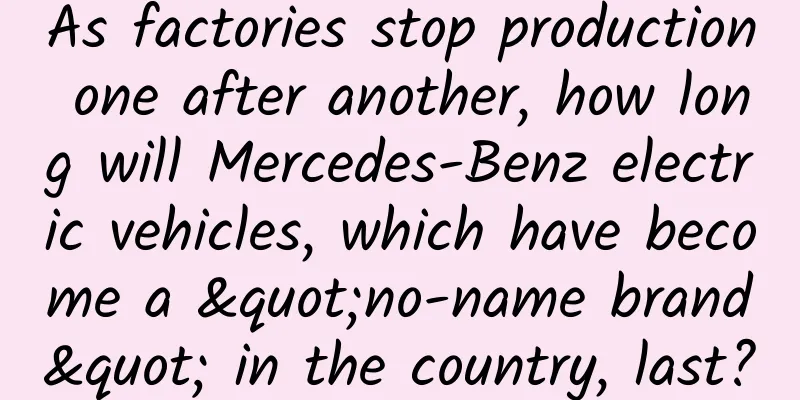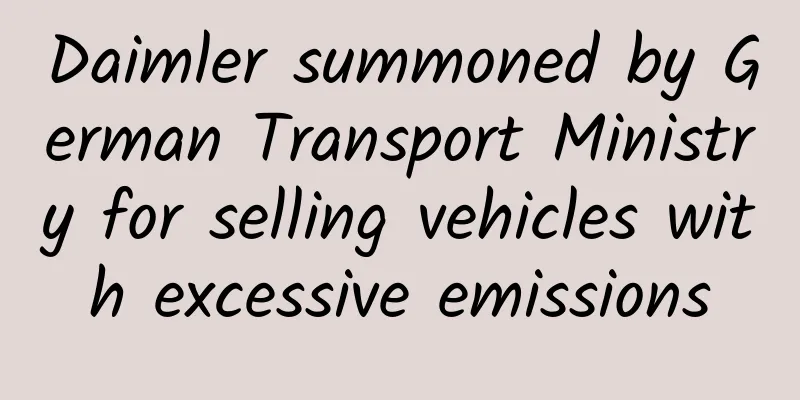As factories stop production one after another, how long will Mercedes-Benz electric vehicles, which have become a "no-name brand" in the country, last?

|
As one of the world's most famous luxury car brands, Mercedes-Benz has an unrivaled advantage and position in the field of fuel vehicles. However, in the new energy vehicle market, it has performed very sluggishly and lost. Its electric vehicle products not only have poor sales, but also have damaged its brand image, and are even nicknamed "unbranded cars" in the Chinese electric vehicle industry by users. Recently, according to media reports, Mercedes-Benz's two major factories in Beijing have stopped production one after another within a week. This news has aroused widespread attention and discussion inside and outside the industry. This also positively proves that Mercedes-Benz's story on electrification has clearly deviated from the established script. Mercedes-Benz will also have a day when its products are not strong enoughAs a car brand with a century-old history, Mercedes-Benz has rich experience and technology in the research and development and manufacturing of cars. However, at a time when electrification has become the most certain trend in the automotive industry, Mercedes-Benz is very conservative and backward in the field of electric vehicles. The electric vehicles it launched are very weak and cannot compete with competing products on the market. At present, Mercedes-Benz's main strategy in the field of electric vehicles is to convert oil to electricity, that is, to transform electric vehicles based on fuel vehicle platforms. Although this strategy saves the initial R&D costs to a certain extent and helps Mercedes-Benz to quickly expand into the market, it also greatly increases production costs and reduces vehicle efficiency and performance, resulting in Mercedes-Benz electric vehicles being inferior to similar competitors in terms of intelligence, range, and charging speed. For example, EQC is based on GLC, EQB is based on GLB, and EQA is based on GLA. These models are almost the same as fuel vehicles in appearance, interior, space, etc., except for the power system. This oil-to-electric strategy makes Mercedes-Benz electric vehicles lack the real characteristics and advantages of electric vehicles, and cannot meet consumers' expectations and needs for new energy vehicles. For example, the EQC has a range of only 415 kilometers, while the Tesla Model 3 has a range of up to 668 kilometers; the EQC's maximum charging speed is only 110kW, while the Model 3's charging speed can reach 250kW, which is more than double the difference in charging speed between the two. Mercedes-Benz has not achieved satisfactory results in terms of intelligence. The intelligence level and user experience of its electric vehicles are not as good as those of domestic Internet car brands such as Weilai, Xiaopeng, and Ideal. The intelligent system of Mercedes-Benz electric vehicles is mainly based on the MBUX system of its fuel vehicles. Although it has some functions such as artificial intelligence and voice control, there is still a lot of room for improvement in data, cloud computing, software upgrades, etc. In summary, the lack of product strength of Mercedes-Benz electric vehicles is an important reason why it has become a "no-name brand" in the domestic electric vehicle industry. Mercedes-Benz lacks real electric vehicle characteristics and advantages in the electric vehicle field and cannot compete with competing products on the market. Mercedes-Benz prices remain highIn addition to insufficient product strength, Mercedes-Benz electric vehicles also have low price competitiveness and are priced too high. Obviously, Mercedes-Benz is still stuck in the arrogance of the past that it can arbitrarily charge a premium based on its brand influence. It is completely unaware that the automotive industry has changed and that brand power without product support has become a castle in the air. In the era of fuel vehicles, the Mercedes-Benz brand has accumulated a century of technology research and development and brand building, and has the halo of a luxury car brand. However, the price of Mercedes-Benz electric vehicles is much higher than that of domestic brands and joint venture brands of the same level, but its product strength is not dominant, and is even inferior to that of competitors. Mercedes-Benz electric vehicles cannot bring consumers enough cost-effectiveness and value. For example, the price of Mercedes-Benz EQC is 579,800-629,800 yuan. The price of the domestic Tesla Model Y of the same level is 349,900-419,900 yuan; the price of the joint venture BMW iX3 of the same level is 466,900-496,900 yuan; the price of the luxury Audi e-tron of the same level is 499,800-549,800 yuan. From these data, it can be seen that the price of Mercedes-Benz EQC is higher than that of its competitors of the same level, and its price range is equivalent to or higher than the highest price of its competitors, but its product strength does not have the corresponding advantage. The price of Mercedes-Benz EQB is 368,800-418,800 yuan. The price of the domestically produced Xiaopeng G3i of the same level is 149,800-189,800 yuan; the price of the joint venture Zeekr X of the same level is 189,800-229,800 yuan; the price of the Tesla Model 3 of the same level is 249,900-349,900 yuan. From these data, it can be seen that the price of Mercedes-Benz EQB is much higher than that of its competitors of the same level, its price is twice or even three times that of its competitors, but its core product parameters are worse. Low product quality and high prices have also greatly affected the sales of Mercedes-Benz electric vehicles. In the first eight months of this year, Mercedes-Benz's first pure electric car, EQC, sold only 167 units in China, while the sales of EQA and EQB were only 2,583 and 4,354 units respectively. Even with substantial discounts in the terminal market, it has not been recognized by Chinese consumers, which shows the failure of Mercedes-Benz's electrification. It is this failure that has led to the suspension of production at its factories. The low price competitiveness of Mercedes-Benz electric vehicles is another important reason why they have become a "no-name brand" in the domestic electric vehicle industry. Mercedes-Benz is overconfident and arrogant in pricing, believing that its luxury brand image can make consumers accept high prices. However, in the new energy vehicle market, consumers are very sensitive to brands, but also very rational. Consumers will not blindly pay for Mercedes-Benz's brand premium, but will pay more attention to product performance, quality, service and other aspects. Mercedes-Benz electric vehicles do not bring enough appeal and trust to consumers in terms of price. Strategic mistakes due to hubrisIn addition to product strength and price competitiveness, Mercedes-Benz also made some strategic mistakes due to arrogance during its electrification transformation, which caused it to lose the initiative and opportunities in the market. Before launching electric vehicles in China, Mercedes-Benz did not conduct market research and consumer analysis, ignoring the Chinese market's needs and preferences for intelligence, digitalization, and personalization. Mercedes-Benz also did not adjust its channels and service systems in a timely manner to adapt to the changes and development of the new energy vehicle market. For example, Mercedes-Benz has not established its own charging network and charging piles, and still relies on third-party platforms to provide charging services in China, which has brought inconvenience and trouble to consumers. In contrast, Tesla has established more than 1,000 super charging stations and nearly 10,000 destination charging piles in China, covering more than 300 cities across the country; Weilai has launched innovative charging modes such as battery swap stations, battery rentals, and mobile charging vehicles, providing consumers with more choices and convenience. Mercedes-Benz's backwardness in charging services has limited the use scenarios and costs of its electric vehicles. In addition, Mercedes-Benz does not provide OTA (Over The Air) remote upgrade services like Tesla, nor does it provide NIO Pilot automatic driving assistance systems like Weilai, nor does it provide full-scenario automatic driving systems like Xiaopeng. Mercedes-Benz electric vehicle intelligent systems still have some unstable and incompatible problems, such as frequent errors or failures in the navigation system, and the voice control system cannot recognize Chinese or dialects. Mercedes-Benz's lag in intelligence has caused its electric vehicles to lose their advantages in user experience and user stickiness. Future prospects and challenges of Mercedes-Benz electric vehiclesFrom the above analysis, we can see that Mercedes-Benz has become a "no-name brand" in the domestic electric car industry mainly due to its insufficient product strength, low price competitiveness, corporate strategy errors, etc. Insufficient understanding and investment in the current electrification trend, as well as arrogance towards consumers, have greatly damaged the reputation of the Mercedes-Benz brand among Chinese people. Under this influence, the two major Mercedes-Benz factories have stopped production one after another. This may be only the result of a stage, and Mercedes-Benz will still face a long winter afterwards. Of course, Mercedes-Benz has not given up its dream of electric vehicles, but has actively embraced this change and formulated a series of electrification transformation plans and goals. Mercedes-Benz is accelerating the research and development and production of its electric vehicle platform, battery technology, intelligent technology, etc. to create real electric vehicle products. Mercedes-Benz hopes that through these measures, it can regain its glory and status in the field of electric vehicles in the future. However, if Mercedes-Benz wants to rise again in the era of electrification, it still needs to face many difficulties and challenges. The story of Nokia tells us that from the peak to the trough, sometimes it only takes one mistake, and when the times abandon you, they will not inform you intimately. As a winner of Toutiao's Qingyun Plan and Baijiahao's Bai+ Plan, the 2019 Baidu Digital Author of the Year, the Baijiahao's Most Popular Author in the Technology Field, the 2019 Sogou Technology and Culture Author, and the 2021 Baijiahao Quarterly Influential Creator, he has won many awards, including the 2013 Sohu Best Industry Media Person, the 2015 China New Media Entrepreneurship Competition Beijing Third Place, the 2015 Guangmang Experience Award, the 2015 China New Media Entrepreneurship Competition Finals Third Place, and the 2018 Baidu Dynamic Annual Powerful Celebrity. |
<<: Looking at iQiyi's IP Ecosystem from the Perspective of Online Literature
Recommend
#warning Do not override methods in categories
[[151478]] In iOS development, category is a very...
Xiaohongshu’s ROI is terrible. Brands should check themselves for these 11 pitfalls!
Half a month ago, I discussed Xiaohongshu brand m...
Driven by money, is Apple's App Store also going to use "pay-for-ranking"?
When it comes to paid search, the first company t...
vivo S6 mobile phone review: a four-camera phone with super long standby time in the 5G era
Although the dividends of the current smartphone ...
Ultraman can win the Nobel Prize by fighting monsters!
The battle process between Ultraman and monsters ...
iOS13.5 performance test: Do 5 old iPhones run faster after upgrading?
Apple has officially launched the official versio...
Q3 advertising trends, insights into advertising on the five major traffic platforms!
The third quarter of 2019 has just passed. What t...
Case analysis of programmatic creative delivery of information flow advertising!
This is the best era. With the support of AI, inf...
Yinchuan gas explosion caused 31 deaths and 7 injuries! You must know these life-threatening firefighting knowledge!
On the evening of June 21, a gas explosion occurr...
Case | Account optimization strategy to reduce ACP by 70% in the real estate industry
Today, Qingguajun will share with you an optimiza...
Hair suddenly stood up in the desert! Netizens: Run! Experts: Don't run
Recently, in Turpan, Xinjiang Tourists' hair ...
Leon Lederman: That weekend night, I figured out how to break parity.
On January 4, 1957, at a traditional Chinese lunc...
WOT2016 Tian Chao: What can big data bring to the information platform?
[Original article from 51CTO.com] The WOT2016 Big...
3 methodologies for selling goods through live streaming!
Nowadays, the so-called sales promotion is actual...









